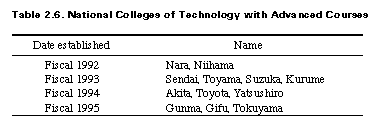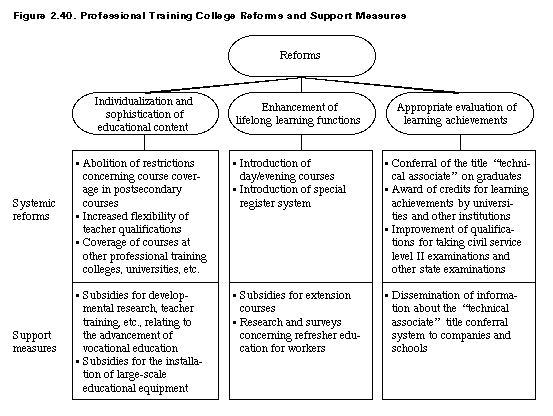| Home > Policy > White Paper, Notice, Announcement > White Paper > JAPANESE GOVERMENT POLICIES IN EDUCATION, SCIENCE, SPORTS AND CULTURE 1995 > Remaking Universities Chapter 2 Section 4 3 | ||
Since the establishment of the special training college system in 1976, special training colleges have made steady progress as educational institutions dedicated to the provision of vocational and specialized technical education in response to social changes. Particularly significant is the increase in the number of professional training colleges (postsecondary-course special training colleges), for which upper secondary school graduation is an entrance requirement. As of May 1995 there were 2,902 professional training colleges, with a total of 665,000 students. In addition to their important quantitative contribution to higher education in Japan, these schools are playing a major role in the diversification and individualization of higher education.
The environment of professional training colleges is being radically altered, however, by factors that include rapid changes in the industrial structure, technological innovation, and the dramatic decline in the 18-year-old population. Professional training colleges need to take advantage of a free and flexible system in order to respond to the growing complexity and sophistication of society's needs through the individualization and advancement of their educational activities. They also need to offer individualized and attractive school environments through such strategies as the enhancement of educational services for adults and workers.
MESSC has implemented a variety of measures to promote professional training colleges. In March 1994 it received a report from the Consultative Committee for Research and Surveys Regarding the Enhancement and Promotion of Special Training College Education. In June that year it amended the Standards for the Establishment of Special Training Colleges for the first time since the creation of the system. It also established a system providing for conferral of the title "technical associate" on graduates of professional training colleges approved by the Minister of Education, Science, Sports and Culture.
In response to the diversification of society's demands and people's educational needs, professional training colleges have established extremely varied and individualized courses covering fields that range from industry and agriculture to medical services, hygiene, education, social welfare, commerce, the garment industry, home management, culture, and general education. They are also restructuring their courses and improving their curricula to keep pace with social changes. In fiscal 1979 approximately 60% of programs covered two years or more. By fiscal 1994 the figure had risen to about 80%. Other efforts to enhance educational content include the expansion of programs oriented to the acquisition of advanced vocational qualifications.
The recent amendment of the Standards for the Establishment of Special Training Colleges resulted in a number of systemic changes designed to enable professional training colleges to respond more effectively to the diverse needs of society. First, the regulation requiring at least 80% of class hours to be devoted to specialized courses was abolished so that consideration could be given to the fostering of a well-rounded personality. Second, a mechanism was introduced to enable students who take courses at other institutions, such as other professional training colleges, universities, or junior colleges, to receive credits. Third, the qualifications for teaching staff were expanded to include people with outstanding knowledge and skills in specific fields.
It is hoped that professional training colleges will respond to these amendments by working to individualize and enhance their educational content, including the expansion and diversification of their educational services through cooperation and coordination with universities and other institutions of higher education.
As educational institutions dedicated to the provision of specialized technical education, professional training colleges have an important role to play in refresher education for adults and workers and other forms of recurrent education. The above-mentioned changes in the Standards for the Establishment of Special Training Colleges were intended to diversify learning opportunities through the introduction of systems designed to encourage professional training colleges to accept adult students, including the day/evening course system and the special register system. Also essential is the development of curricula that reflect the needs of businesses and workers in order to promote the admission of adults and workers. MESSC initiated a research project for this purpose in fiscal 1995.
In the past, professional training college graduates were not awarded any title. Since January 1995, however, it has been possible to confer the title "technical associate" on graduates of professional training colleges approved by the Minister of Education, Science, Sports and Culture. The purpose of this change is to ensure that learning achievements at professional training colleges are properly evaluated, improve social recognition of graduates, and stimulate interest in lifelong learning.
The requirements for conferral of the title "technical associate" are
and that the results are used as the basis for certification that students have completed the program. In fiscal 1994 the title "technical associate" was conferred on approximately 230,000 people.
Moreover, as a result of amendment of the Standards for the Establishment of Universities, since fiscal 1992 it has been possible for universities and other institutions to award credits for learning achievements at professional training colleges. Already a number of universities and other institutions use this system to award credits for a variety of studies carried out at professional training colleges, and use of this mechanism is expected to increase.
Graduates of professional training colleges are increasingly being treated in the same way as junior college graduates in regard to employment conditions and eligibility to take state examinations for various qualifications. Still further improvement is anticipated.



| Back to Top | MEXT HOME |